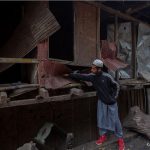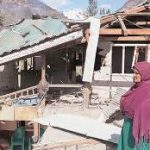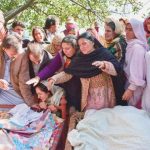Gender Inequality in KP and Its Socio-Economic Impact

Gender inequality is a serious issue that affects millions of women and girls around the world, especially in developing countries like Pakistan. Khyber Pakhtunkhwa (KP) continues to grapple with significant gender disparities, affecting its socio-economic landscape. There is a need to explore the extent of gender inequality in KP, highlighting its socio-economic impact through the lens of statistics and case studies. Gender inequality in KP is not restricted to any single field, instead it encompasses the entire socio-economic fabric of the province. There are multiple reasons due to which this trend is so dominant in this part of the country despite widespread of fast communications means like internet, education and information about achievements and roles of both genders in daily lives around the world.
KP faces multiple challenges such as poverty, insecurity, terrorism, natural disasters, illiteracy, poor health and infrastructure. These challenges are exacerbated by the prevailing gender inequality that limits the opportunities and rights of women and girls in various aspects of life. According to the Gender Inequality Index (GII), KP ranks second lowest among the provinces of Pakistan, with a score of 0.651 (where 0 represents perfect equality and 1 represents perfect inequality). The GII measures gender disparities in three dimensions: reproductive health, empowerment and economic activity. For a country like Pakistan, where total female population is more than half of total population (51%), ensuring gender equality becomes critical socio-economic imperative.
Some of the case studies of gender inequality in KP have been discussed below:
Education: Education is a fundamental right and a key factor for human development and empowerment. However, in KP, many women and girls are deprived of this right due to various social, cultural and economic barriers. According to the Annual Status of Education Report (ASER) 2019, only 17% of women aged 15 years and above are literate in KP, compared to 76% of men. The gender gap in literacy is even wider in the NMDs, where only 7% of women are literate, compared to 63% of men. The enrolment rate of girls in primary schools is also lower than that of boys (66% vs 77%), and it drops significantly at the secondary and higher levels. The main reasons for girls’ low enrolment and retention in schools include poverty, lack of access to quality education facilities, insecurity and harassment. Apart from these factors, cultural norms that prioritize early marriage over education for girls are major hurdles for young women in the province. This exemplifies the systemic barriers faced by girls in accessing education and the subsequent impact on their future opportunities.
Health: Health is another essential right and a prerequisite for well-being and productivity. However, in KP, many women and girls suffer from poor health outcomes due to lack of access to adequate health care services, information and resources. According to the Pakistan Demographic and Health Survey (PDHS) 2017-18, the maternal mortality ratio (MMR) in KP is 395 deaths per 100,000 live births, which is higher than the national average of 276. The MMR is even higher in the NMDs, where it is estimated to be over 500. The main causes of maternal deaths include hemorrhage, sepsis, eclampsia and unsafe abortion. The contraceptive prevalence rate (CPR) in KP is also low at 34%, compared to the national average of 38%. The CPR is even lower in the NMDs, where it is only 13%. The low use of family planning methods leads to high fertility rates, unwanted pregnancies and unsafe abortions.
Gender Disparities in Employment: Gender inequality in KP is also reflected in the labor market. Women face limited opportunities and unequal treatment in terms of job availability, wages, and career progression. The labor force participation rate for women in KP is significantly lower than that of men, with only 23.7% of women participating compared to 86.6% of men (Pakistan Bureau of Statistics).
There are multiple cases where qualified female professionals in the field of engineering, management and administration faced challenges in securing employment. Despite their qualifications, they struggled to find job openings and faced biased behavior during interviews. Eventually, many such female professionals had to settle for a lower-paying job, illustrating the gender-based hurdles that women encounter in the employment in KP.
Gender-Based Violence and Discrimination: Gender inequality in KP is further compounded by pervasive gender-based violence and discrimination. Women and girls often face physical, psychological, and sexual abuse, which hampers their personal development and overall well-being. The culture of patriarchy, reinforced by societal norms and practices, contributes to the persistence of gender-based violence. Due to this culture, the victims of gender based violence struggle to find legal and financial support and justice due to societal pressures and a lack of effective mechanisms to address such cases. These cases underscore the urgent need for comprehensive measures to combat gender-based violence and protect women’s rights.
Socio-Economic Impact: Above mentioned gender based discriminations adversely effects the standing of women in KP on social and economic fronts. The socio-economic impact of gender inequality in KP is substantial and far-reaching. When women are denied equal access to education and employment opportunities, it hampers their individual development, perpetuates poverty cycles, and restricts economic growth. Gender inequality also leads to a loss of human capital, as the talents and potential contributions of half the population remain untapped.
Furthermore, gender inequality impedes social progress by reinforcing discriminatory norms and limiting women’s participation in decision-making processes. When women are excluded from positions of power and influence, their perspectives and experiences are overlooked, hindering the development of inclusive policies and sustainable development.
Gender inequality in KP has profound socio-economic implications that hinder the overall progress of the province. Addressing these disparities requires a comprehensive approach that tackles systemic barriers, promotes gender-responsive policies, and fosters a culture of gender equality. By empowering women and girls, promoting their access to education and economic opportunities, and combating gender-based violence, KP can pave the way for a more equitable and prosperous future.







Comments